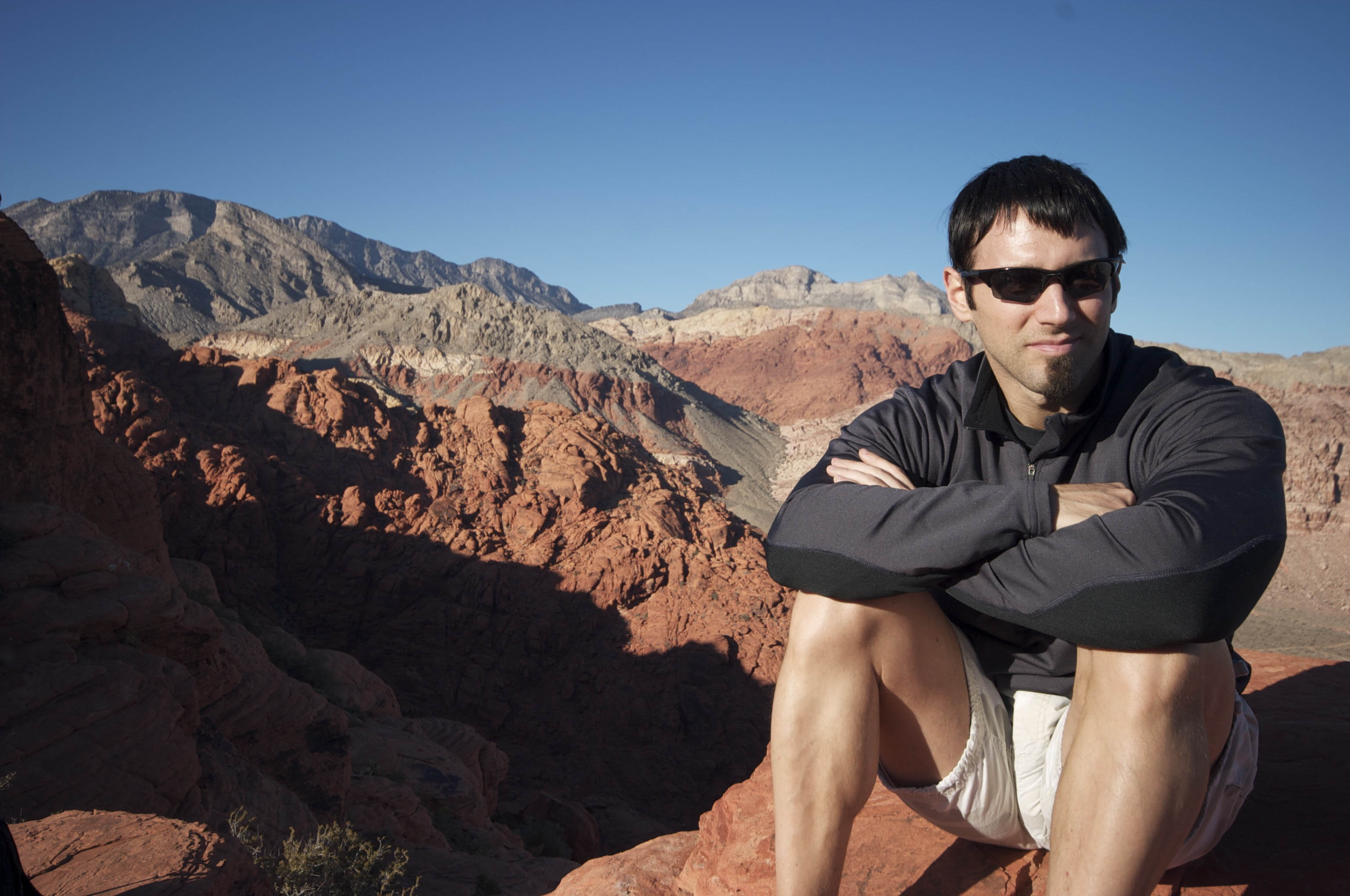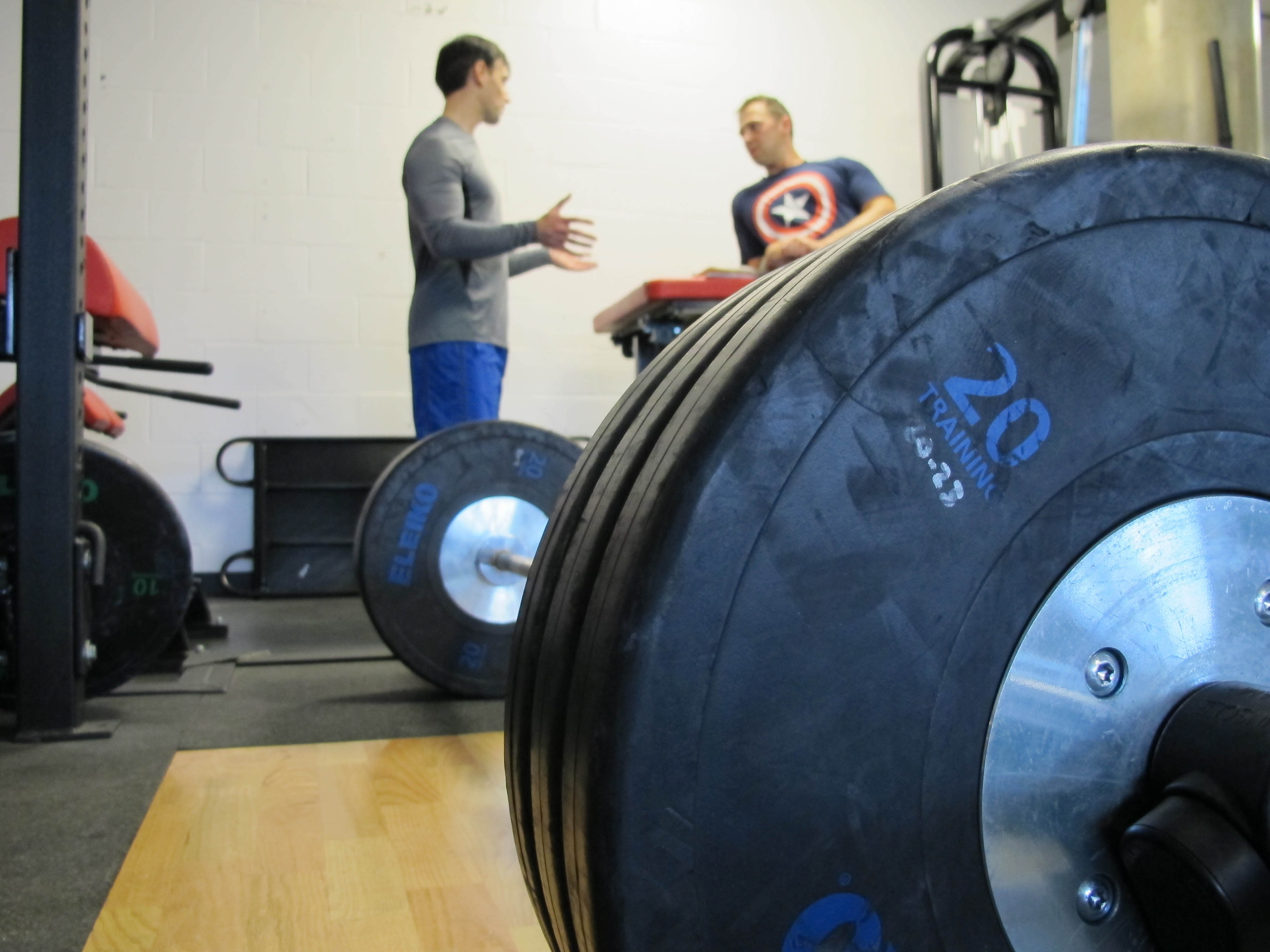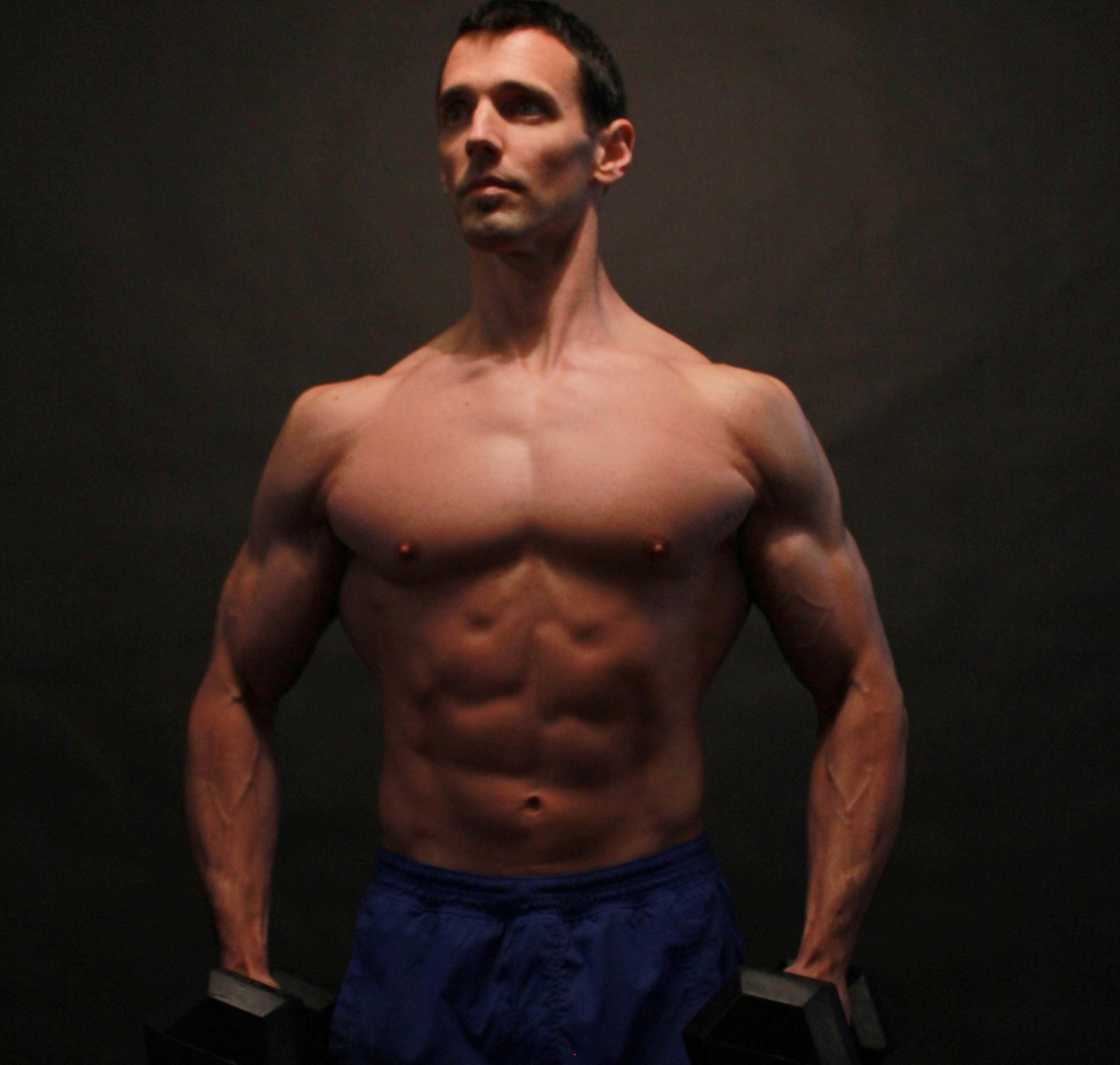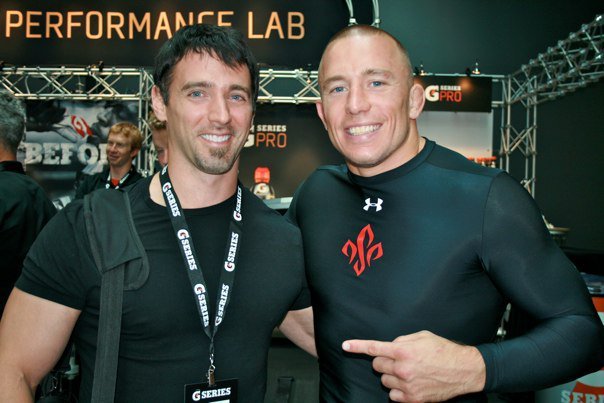Through his books and articles, it’s estimated that Dr. John Berardi has published nearly a million words.
Most deal with how to build a lean, healthy body through eating and exercising. They represent years of research, practice, and a knack for distilling complicated information into bite-sized action steps.
Some words — the ones full of personality and life experience — hint at the “real John Berardi”, the man behind the computer screen, the enigma thousands of readers have tried to piece together from interviews, articles, and video clips.
Yet even the diligent reader is left with a bit of a skeleton — only a partial understanding of what makes him tick.
Because, despite the million words Berardi has written, only a few thousand have been written about him. And, for a better understanding of who JB really is, it’s those words that add the flesh and the blood.
 Dr Berardi enjoying some outdoor time at Red Rock in Nevada.
Dr Berardi enjoying some outdoor time at Red Rock in Nevada.
Finding his voice
My story begins, as all good stories do, like this: I am sitting in a sauna with a shirtless Dr. John Berardi.
The man informally known as JB or The Large Professor, founder of Precision Nutrition and one of the biggest names in sports nutrition, is not satisfied with the performance of the infrared heating elements.
“This one, down here” – he gestures below the wooden bench on which he sits – “blasts out pretty good. But it really toasts your junk. All of a sudden, you think, ‘Do I smell barbecue?’”
We crack up.
Crotch temperature metering aside, it’s a bizarrely cerebral sweat lodge session.
We’ve just finished a leg circuit workout. 5 rounds of JB-style training can inspire a spiritual quest somewhere around the 4th set of front squats. So exploring our inner totems and career visions seems right, despite the slight weirdness of comparing crevice funk with a scantily clad coworker.
We talk about grad school and mentorship. About the late 1990s and early 2000s when JB was self-immolating in a frenzy of productivity, spewing article after article to develop JohnBerardi.com, creating The Legend of Large Professor all over the web, and sizzling the midnight oil with course work, lab time, and teaching.
He tells me how it was difficult, in the beginning, to find his voice. To straddle two worlds: the foulmouthed, machismo-saturated internet battlefield and the intellectual sweatshop of academia.
How powerful the temptations were to float with the current, like the red blood cells that he extracted during self-taught phlebotomy sessions on weekends, when he’d sneak into the lab and run his own experiments.
And how he found that voice when the lab owner busted his Saturday shenanigans.
“This guy never – ever – came to the lab. So, one Saturday, he walks in to grab his mountain bike. Yea, he stored it in our research lab. Anyway, he comes in and I’m there with thirty guys. We’re doing performance tests. I’m drawing blood. And he’s pissed. He tells me I’m not supposed to be there. I tell him that research labs are for running experiments, not storing mountain bikes. And that was pretty much the end of it.”
Unorthodox. Inquisitive. Determined. Idealistic. Grounded.
This is the complex JB that precipitated from those life experiences, but that rarely appears in his polished public persona.
To his legions of adoring fans, JB is like the smart older brother to your dweeby self, the cool sibling who has a grownup job and a cool car and biceps bigger than your head, and who teaches you about dating and cars and how to get swole.
But twenty-odd years ago, JB was the dweeb.
He grew up as a skinny guy, the scrawny son of blue-collar Italian immigrant parents in Philadelphia, trained to work hard and dream little.
“I didn’t have a lot of friends growing up. I was quiet and an introvert. Luckily I was into working out, and I was into sports. In high school, it’s pretty easy to coast on this stuff. People think it makes you cool. So I could just blend in. I didn’t have to say anything or stand out. I could just be there, and listen.”
This time-honed skill of careful listening and observation has made JB an inspired communicator and translator of research for the masses. He is an alchemist who distills lab gibberish into simple yet profound truths. He turns equations into Zen proverbs. His coaching lessons contain both systematic reviews and Seinfeld references.
 Training talk with Coach Tyler Goodale at Olympic training centre in Victoria, BC
Training talk with Coach Tyler Goodale at Olympic training centre in Victoria, BC
From complexity to simplicity
These days, unlike his years of epic output, less is more.
His workspace is neat, masculine, quasi-ascetic, a Scandinavian-Japanese hybrid of snowy garden view, tidy technological firepower, and emptiness. He’s presently figuring out how little exercise he needs to do in order to stay ripped. (Ninety minutes a week. But they’re darn good minutes.)
In the service of “do less”, he recently encapsulated everything he knows about fat loss into fifteen total minutes of video and a few cheat sheets for his free five-day fat loss course – a project that’s sort of like turning the NASA moon lander into blueprints that a seven-year-old could assemble from sugar cubes and toothpicks. It’s his approach to understanding the human condition – the complexity and challenge of simplicity.
For JB, powerful change incubates in tiny, mundane, daily actions.
Practicing what he preaches – making change a one habit at a time process – he ended up finding the voice that was silent a decade ago. He grew out of his quiet conformity and skinny body. And has become a compelling, intellectually muscular speaker and writer.
Unlike many scientists who prefer to hide among their test tubes, he’s charismatic and driven to connect meaningfully with his clients. Yet he still listens as well as he talks.
In high school, though, he was listening to other things. At 18, instead of a brilliant Renaissance-man-in-training, he was well on his way to being a dropout with rotten grades and a dead-end job.
One night, he’d been out partying with some ne’er-do-well friends. On the way home along a deserted country road, high and drunk, their driver purposefully swerved with inebriated Hey-guys-watch-this idiocy. The car bounced off a curb and plunged, sickeningly, down an embankment.
“You know how people say their lives flashed before their eyes? And time slows down?” JB asks me. “Well, for me, it really did.”
“I literally started seeing scenes from my life during those few seconds, and the final one was seeing my own parents at my funeral. It wasn’t just that they were sad… they were ashamed of me. They were pretty much the only people that gave a shit if I died, and they would have been ashamed of me.”
Through some twist of trigonometry and tree placement, the guys escaped alive and relatively unscathed. With characteristic determination and decisiveness, JB literally walked away from the car, away from the friends who’d nearly killed him, all the way home.
“I never spoke to those guys again.”
With those first frightened and bruised steps down the road, JB began his trek towards Large Professorhood.
Illusion and relationships
As every seasoned bodybuilder knows, a beautiful physique is about two things: illusion and relationships. A lean waist makes your lats look like a landing strip. Bones like a bird make your muscles look massive by comparison.
In his photos, JB hulks. In person, he hovers.
He’s surprisingly light and lean – not a lumbering linebacker, but a sprightly, compact, sprint-ready quarterback. Although he can definitely stuff the dudely equivalent of a wild bikini, he’s not a Jersey Shore meat slab. He’s dieting these days, so his face is chiseled, with delicate cheekbones.
When he tells me the story of how he almost died, we are sitting in a train station in February. Enveloped in a puffy parka, in the weak winter light, recounting his near-death, he looks almost fragile. I notice tiny icicles of gray in his hair. This moment, padded with time and down coats, seems more intimate than sweating together.
Upon vowing to change his path, JB discovered that life transformation can be a lonely place.
“I went for two years barely speaking to anyone. I had no friends. I was totally, completely alone.”
He enrolled in a local community college to see if he could do anything useful with himself, perhaps attain a passing grade and some useful occupational certification. There, he found the weight room, and his teacher.
Brains and brawn
When the student is ready, the teacher appears. Craig appeared in JB’s life. He was a gentleman and a scholar, a philosopher of the world and the weight room. And he whupped JB’s new baby self like a lioness swatting her cubs.
JB often tells the story of how they met.
“I was struggling during a set of leg presses, performing them miserably no doubt. And Craig comes over to give me a spot. After I ended the set, he invited me to do a proper leg workout with him. The next morning. At 5:30 AM.”
“Now, Craig was a monster. He had nearly 100 lbs of muscle on me. I was terrified but I showed up anyway. We ended up training together for the next 2 years. The dude also taught me about business, about education, about…life.”
Every week, JB struggled home sore and laden with books. The journey transformed his body and brain. Suddenly, it seemed, the world was full of possibilities.
The Large Professor was launched.
 JB found his motivation, and his spirit, in the weight room
JB found his motivation, and his spirit, in the weight room
The donuts
We talk about the challenges of eating well, of food cravings. It’s refreshing to know that one of the most disciplined men in the business occasionally succumbs to the siren song of sugar while getting ripped. Yet some of JB’s eating episodes are like Data from Star Trek learning to be human – he almost gets the junk food concept right, but not quite.
Now deep into a dieting phase, JB tells me he decided to try a Tim Hortons donut on a refeed day, to see what all the fuss was about. He found himself befuddled by the stampeding Saturday crowds and array of choices.
“I didn’t even know what half of these things were. What the hell is a Dutchie?”
After settling on his selection, he confronted the reality of the globalized food industry: deskilled workers, the mechanization of eating, and the unbelievably easy path to Supersizing sub-par food.
“I only wanted four donuts. Except, the counter person told me, the cinnamon roll wasn’t considered a donut. So I couldn’t really get it as part of a ‘donut roster’. He also told me that asking for four donuts was confusing their system. It was way easier for them to give me half a dozen. But I didn’t want half a dozen. I just wanted four.”
That was when the anxious counter worker fetched the manager.
“Now I’m feeling like I’m in really big trouble. I’m wondering why this is so hard. I just. Want. Four.”
“Also, I’m confused. Blueberry fritters, Dutchies, and walnut crumbles – the other 3 donuts I want – are all square-ish. So, arguably, isn’t a cinnamon roll – which is round – most like a donut?”
Faced with JB’s wackily unorthodox donut selection and geometry logic, the manager insisted he get six. After JB offered to buy three, then spin around and pretend to be a different person to buy one more, the manager conceded defeat and JB emerged victorious.
He brought his spoils home… to eat with a knife and fork. “I really wanted to enjoy these donuts. I practically put out the good china – set them all on a nice plate in the centre of the table.”
Ultimately, however, the donuts disappointed. I fill JB in on the history of Tim Hortons’ donut demise – fresh-baked on-site was transformed in the 1980s to “frozen in a factory, then reheated”.
JB grows thoughtful. “It makes me wonder whether food, in general, just sucks these days.”
The donuts he remembers from his childhood in Philly, bought after the family’s weekly church outing, seemed somehow meatier, gravid with chocolate and vanilla custard, like soft sugar-dusted sandbags.
“Or if it’s always sucked and I just didn’t know it because my taste buds were all screwed up from eating too much junk.”
“And why does this food” – he gestures to his lunch of home-made coleslaw, organic sausage, and organic sauerkraut (keeping the intestinal bacteria happy) – “taste awesome to me now?”
“It’s no wonder people think they don’t like healthy food. The food just doesn’t taste good to them now because their taste buds are all screwed up.”
“And maybe there’s no such thing as a ‘right taste’ because taste changes. Junk food just tastes better to them…for now.”
The “for now” part is important. Gravely important. In JB’s world, no decision is irreversible, no path impossible.
“In fitness and in life, people agonize so much over what to do. Me, I say ‘just try it and see’. Doesn’t really matter what it is. Just try something. You can sort out the rest later.”
Things change. We evolve. A client in Precision Nutrition’s Lean Eating coaching program may be revolted by broccoli in the first month, then half a year later be devouring it voraciously.
Nothing – no self, no habit, no decision – lasts forever.
This attitude – that any and all change is possible – propels both JB’s life and Precision Nutrition’s body transformation programs: Lean Eating and Scrawny to Brawny.
From swingle to family man
For JB, the only thing with permanent consequences has been the birth of his ten-month-old daughter. He’s sacrificed his playboy sports car in the name of serviceability… but not his adventurous spirit.
He’s just comfortable living the contradiction of driving a behemoth Harley-Davidson pickup truck with a baby seat and toys in the back.
At lunch, he spoon-feeds his wife Amanda Graydon a mouthful of fish oil, like a mother bird tending to a nestling, while Amanda’s hands are occupied holding baby Amalynn.
It’s a far cry from the swingle lifestyle he once lived as a young guy busting his ass on a startup company with Precision Nutrition’s co-founder Phil Caravaggio. Or perhaps, the image that his fans projected on him.
“When Phil and I lived in that downtown loft in Toronto, we had a good time. I felt incredibly free, unencumbered. All the things I have now – a home, a family – all seemed like they’d be a huge burden. Growing up, these were things I decided I didn’t want. I wanted to travel and explore. I wanted to collect experiences.”
When he moved to the big city, he’d visit every neighborhood, every corner of the city. He’d ride the subways sometimes, with a book, just to relax. “I’d never been anywhere with a subway before, so it was exciting and interesting… and maybe it was just a quiet way of getting adventure.” He traveled far and wide, doing speaking gigs and living Large Professor-style.
Things change.
“Now, everything is different. I crave my home and my family and my quiet time. And traveling has become a pain in the ass. People ask me to come and do events. They offer me money and I’m honored. Yet I think to myself, ‘OK, that sounds like a good deal. But in saying yes to that, what do I have to say no to?'”
“As Alwyn Cosgrove once told me, everything you say yes to means saying no to something else. And saying yes to more travel and speaking means saying no to my family. And to this awesome work I get to do every day as part of the PN team.”
While JB is equally confident making brrrrbbb daddy-motorboat noises for Amalynn and discussing nutritional biochemistry, one wonders what happened to the tough-guy image foisted upon him a decade or so ago, while writing for T-mag.
Against a backdrop of toddler toys, a bookshelf of children’s books (including the Narnia Chronicles), a keyboard (which he’s teaching himself to play) and a tidy living room in the house that he designed as a rural family retreat, I ask him about a T-mag interview I read recently, in which writer Chris Shugart asks whether JB gets “more ass than a Studio 54 toilet seat.”
JB laughs.
“The problem,” he says, “with a lot of these internet identities is that you’re writing about exercise and nutrition. You’re not giving people personal information. Or, if you do, it’s only partial. So people can’t get to know the real you. In order to fill in the gaps, they make up a personna.”
JB’s not overly troubled by the contradictions. He cultivates them. He prefers to let people interpret him as they wish, while deliberately sabotaging their assumptions with high quality work, a genuine desire to help people, and a tremendous commitment to his family and the Precision Nutrition Team.
 With client and UFC welterweight champion, Georges St-Pierre
With client and UFC welterweight champion, Georges St-Pierre
PN: From one-man show to phenomenon
Precision Nutrition is his lifeblood now and he takes it very seriously.
“This isn’t just a job. It’s not something I do for my ego. It’s my life’s work. And even saying that isn’t enough. It consumes me.”
This drive is also what makes Precision Nutrition – which grew from JB and Phil working in JB’s basement to a highly profitable company of nearly thirty staff scattered across North America – work. “We’re all these different people, united by this same drive and passion.”
Although you can change, you can never take back anything you say on the internet. The Legend of Large Professor now precedes him wherever he goes. He’s often met by swooning fans.
“Sometimes it feels weird. A lot of fans come up to you with an agenda. For example, they want to say hi, or they have a question. But when you meet people under these circumstances, where they expect you to be a Famous Person, it’s like they’re really waiting for you to do something awesome.”
He spreads his arms in a fish-that-got-away-story posture, opens his big blue eyes wide, and cranks his face into an exaggerated caricature of a grin. “‘Come on, Dr. Berardi. Do something…awesome!’”
He understands, of course. After building his own body and spirit, coaching thousands of clients, and devouring mountains of philosophy and applied psychology, he now comprehends human nature and commands a magnetic, empathetic-yet-expert presence.
Whatever the reason, whatever the problem, it’s clear that many people feel like JB can fix them. Somehow, he just attracts people who also want to change and improve.
“When I was in university, people suddenly started asking my advice on things like relationships. I didn’t know what to do, so I gave the best advice I could. But it was sorta BS. I’d never had a meaningful relationship.”
Speaking of relationships, while his handsome visage never fails to get the female Lean Eating clients a-twitter (and perhaps approximately 10% of the male clients), the folks with the biggest crush on JB are the scrawny young guys who wish they could be like JB – whatever omnipotent superhero they imagine him to be.
To help these guys live their Charles Atlas dreams, JB’s poured his charisma, research, and personal experiences into Precision Nutrition’s Scrawny to Brawny program.
Naturally, he understands the desire for self-improvement, and has a special empathy for bright young guys searching for meaning and self-determination. In fact, he’s recently hired three as coaches and writers.
“I think maybe there’s a mid-20s crisis,” he says, “it’s when you realize that all the expectations you’ve had just might not come to fruition. But it’s a good thing to go through. You realize that the expectations weren’t based in any reality. And certain parts of yourself get ground down. All the bullshit you were carrying around. All the entitlements or over-simplified views of the world.”
Amanda, popping into the conversation, suggests that this existential crisis makes the twenties worse than the terrible twos, which aren’t far away for Amalynn. I point out that at least twenty year olds don’t flush things down the toilet or drink household chemicals. (At least, not so often.)
Time to squat
After all this soul-searching and sauerkraut, nothing cleanses the palate like squats. JB and I hit his home gym, which is better equipped than many commercial gyms.
Amanda, who is something like a cross between a tiny Valkyrie and a Swiss milkmaid, drops in while we’re air squatting and kettlebell swinging. She radiates sunny good health and a cheerful maternal serenity, although she could easily be mistaken for Amalynn’s teenage babysitter, rather than her mother.
Wearing pink running shoes that match her pink top, she fires up her powerful former-figure-skater legs, explodes into ten minutes of inclined treadmill sprints, then leaves in a pink floral-scented cloud.
“Amanda, you’re making me look bad,” JB grunts, between reps. I’d crack up at the idea of anyone making JB look bad, but my oxygen supply is currently occupied by my straining quads.
If there’s one word that defines JB, it’s belief. His belief in the power of self-transformation and the inevitability of change is profound. It drives him to create more and more opportunities for others to change as he himself has done.
Along with his books and coaching programs, he’s recently put out a nutrition certification for coaches and trainers. With this, he hopes to change an entire industry too. Eventually. One step at a time.
According to JB, nothing is permanent. Everything is negotiable. And change is possible. For everyone. It’s a simple, but not easy, practice – one that he works hard to live himself. Every day of his ever-changing life.




Share